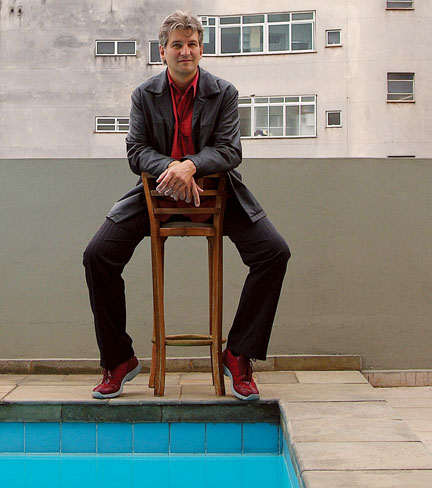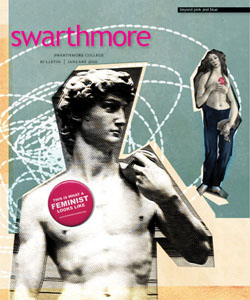Jazz with a Difference
Cornell Visiting Professor Hans Lüdemann makes music beyond time and space.

During his career, Lüdemann has performed throughout the world with many renowned jazz musicians and has recorded more than 20 CDs of both solo and group performances. He describes his relationship with music as a “love affair."
Captured in the stage light’s golden circle, Hans Lüdemann’s long, slender fingers deftly work the keyboard of a majestic grand piano. The internationally acclaimed German jazz virtuoso coaxes out a slow, haunting seven-note melody—a theme that will recur repeatedly as the piece “Turning Points” develops. Eyes closed, lips moving, Lüdemann murmurs to himself, “as if I’m breathing what I’m playing,” he says later. He leans in over the keys, stretches back, occasionally rising briefly from the piano stool, as the music flows within and beyond him. The riveted audience in Lang Concert Hall listens as Lüdemann sets the mood for the concert by Trio Ivoire, a group he founded 10 years ago.
The dimensions of “Turning Points” expand when Ivory Coast native Aly Keita, playing balaphon—a wooden West African instrument somewhat similar to a xylophone—and Dutch-Indian Chander Sardjoe, playing drums and percussion, join in. In a glorious rebellion against convention, musical, continental, and cultural boundaries blur and fade as the trio effortlessly blends elements of Western jazz with traditional African music, all sustained by Sardjoe’s pounding rhythms. Lüdemann and Keita take turns carrying the theme; at times, the audience claps to the beat; the melody quickens, gains momentum, and, peaking, ends. The spell is broken, and the packed hall resounds with cheers, whistles, and applause.
The two-hour concert showcases a combination of pulsing jazz compositions interspersed with slower, gentler melodies such as Keita’s hypnotic, lullaby-style “Ha Iri.” Playing the sanza, an instrument consisting of rows of staggered metal keys placed on a wooden sounding board attached to a resonating vessel, Keita produces sound by flicking the keys with his thumbs. Lüdemann’s “The Virtual Piano” is the result of his electronic manipulations of the piano sound to make audible what he calls “the notes between the keys, the music beyond the tones.” The resulting composition is eerily, discordantly mesmerizing.
During the performance, the musicians’ instruments become extensions of the players’ bodies. Piano keys merge with fingers; flying mallets at the ends of waving arms race as one over balaphon keys; drumsticks connect with hands, stroking, tickling, tapping, and pounding the drums. With flawless synchronization, the musicians play off of each other, teasing with games of improvisation, exchanging mischievous, secretive smiles as they plan their musical coups, tossing riffs back and forth in joyful competition, communicating via the music in a stunning display of percussive virtuosity.
These men love working together, and it shows.
As the final piece mounts to a brilliant crescendo ending in an explosion of pounding sound and rhythm, the audience stands and roars approval, demanding more. The trio obliges with “Wenn du weite Wege gehst” (When you walk long paths), the composer’s tribute to their longtime, far-reaching, and always evolving collaboration.
This performance on Swarthmore’s campus marks Trio Ivoire’s American debut. It also marks Ludemann’s first public performance as the College’s Julien and Virginia Cornell Distinguished Visiting Professor of Music.
LÜDEMANN’S RESIDENCY AT THE COLLEGE, he says, was due to pure happenstance. The father of Associate Professor of German Studies Sunka Simon attended a Lüdemann concert in Germany and liked it enough to buy a CD, which he sent to his daughter. Simon, whom Lüdemann had met in Los Angeles in the late 1970s and with whom he had not been in touch for more than 20 years, listened to the CD and suggested inviting the Trio Ivoire to perform at the College.
During negotiations about the concert, Simon mentioned the Cornell Professorship to Lüdemann, sparking his interest.
“I had a telephone conference with members of the Music Department, sent in all my documentation, and, then, it all went really fast,” he says. The professorship is his first teaching job in the United States.
As a member of the music faculty, he fits right in. For 15 years, Lüdemann taught piano and composition and presented jazz workshops and guest lectures in conservatories throughout Germany as well as in Italy and Africa, before taking a two-year break from teaching to fulfill a growing demand for concert performances. As an exchange student in an LA high school from 1978 to 1979, he acquired both fluency in English and a U.S. high school diploma. Once back in Hamburg, he graduated again, this time from his German high school.
His talent spotted early, Lüdemann started classical piano lessons at 6, then spent his teens performing with various groups and working on his own compositions. He studied jazz piano and composition at the Hamburg and Cologne conservatories and was the first musician in Germany to receive a master’s degree in jazz piano performance. He has performed throughout the world with many renowned jazz musicians and has recorded more than 20 CDs of both solo and group performances. He describes his relationship with music as a “love affair.”
THE AWAKENING OF LÜDEMANN’S INTEREST in African music was no less serendipitous than his finding his way to Swarthmore.
“I first became exposed to African culture when my older brother went to work there, and I visited him,” he says. His sister has been married to an African for more than 25 years.
His relationship with African music developed slowly, and for a long time, he didn’t realize how important it would become for him. Constantly surrounded by its rhythmic richness, he was fascinated and learned as much as he could about the traditional musical culture that ultimately gave birth to jazz. In 1999, touring Africa with the Goethe Institut, he met Aly Keita, the balaphon virtuoso. Following the pull of a strong musical connection, they formed the Trio Ivoire.
“I found myself wanting to try to transcribe some of the African music for the piano,” Lüdemann says, stressing the unlikelihood of such a union, calling the piano “the quintessential western instrument.” Hardly any pianists play African music, he says. For Lüdemann, the possibility of adapting for the piano what he describes as the most advanced, complex, polyrhythmic, and polyphonic music seemed like a welcome and extraordinary challenge. “For me, it was a chance to find a different role—different perspectives for the piano—to go in my own totally new direction.”
The Trio Ivoire’s combination of traditional African instruments and piano is unique, Lüdemann says. “We worked hard to create an identity. Because there’s no other group with this particular mix of instruments, we had nobody to imitate and neither is there anyone to compare us to.” And because African music comes from an oral tradition and Keita does not read music, they all learn the repertory by ear and memorize it. “Aly’s memory is amazing,” Lüdemann says, “and because the repertory is in our heads, we can play any piece, any time.”
IN HIS ROLE AS CORNELL PROFESSOR, Lüdemann is teaching two courses this academic year: a fall course on contemporary jazz; and, this spring, another on African music in a transcontinental context, exploring the African Diaspora and the connections and influences between western music, popular music, and jazz. Further responsibilities include instruction in piano, workshops, lectures, and performances by outside artists, of which the Trio Ivoire concert was the first.
Delighted that the professorship’s budget will allow him to bring guest artists to perform on campus, he is planning to invite some of the musicians with whom he has performed—such as jazz legend Paul Bley, Zimbabwean mbira player and singer Chiwoniso Maraire, Aly Keita, and some of his jazz colleagues from New York City. He’ll also give a solo performance on March 29.
“For me, Swarthmore is a dream of an academic institution,” he says, marveling at the nonhierarchical structure of the community, which, he says, is very different from European universities. Enjoying the collegiality, he says: “This level of intelligence among the students is very stimulating. I can discuss anything with them and go deeper, push the limits, be myself.”
Unfortunately, there was no pushing the limit on our interview time. Lüdemann needed to run off to practice before heading across the Atlantic to Strasbourg, France, to play at the city’s famous jazz festival.
 Email This Page
Email This Page